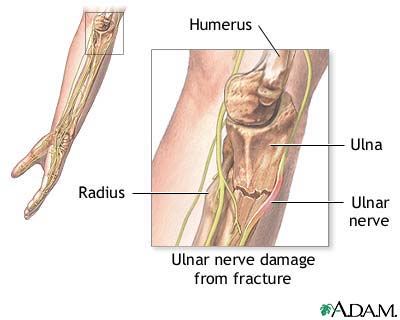Definition
Ulnar nerve dysfunction is a problem with the nerve that travels from the wrist to the shoulder, which leads to movement or sensation problems in the wrist and hand.
Overview, Causes, & Risk Factors
Ulnar nerve dysfunction is a common form of peripheral neuropathy. It occurs when there is damage to the ulnar nerve, which travels down the arm. The ulnar nerve is near the surface of the body where it crosses the elbow, so long-term pressure on the elbow may cause damage.
The damage involves the destruction of the nerve covering (myelin sheath) or part of the nerve (axon). This damage slows or prevents nerve signaling.
A problem with one single nerve group (such as the ulnar nerve) is called mononeuropathy. The usual causes are:
- Direct injury
- Long-term pressure on the nerve
- Pressure on the nerve caused by swelling or injury of nearby body structures
Entrapment involves pressure on the nerve where it passes through a narrow structure.
The ulnar nerve is commonly injured at the elbow because of elbow fracture or dislocation. Prolonged pressure on the base of the palm may also damage part of the ulnar nerve. Temporary pain and tingling of this nerve is common if the elbow is hit, producing the experience of hitting the “funny bone” at the elbow.
In some cases, no cause can be found.
Pictures & Images
Ulnar nerve damage The ulnar nerve originates from the brachial plexus and travels down arm. The nerve is commonly injured at the elbow because of elbow fracture or dislocation. The ulnar nerve is near the surface of the body where it crosses the elbow, so prolonged pressure on the elbow or entrapment of the nerve may cause damage. Damage to the ulnar nerve may involve impaired movement or sensation in the wrist and hand.
The ulnar nerve originates from the brachial plexus and travels down arm. The nerve is commonly injured at the elbow because of elbow fracture or dislocation. The ulnar nerve is near the surface of the body where it crosses the elbow, so prolonged pressure on the elbow or entrapment of the nerve may cause damage. Damage to the ulnar nerve may involve impaired movement or sensation in the wrist and hand.
-
Ulnar nerve dysfunction: Overview, Causes
-
Ulnar nerve dysfunction: Symptoms & Signs, Diagnosis & Tests
-
Ulnar nerve dysfunction: Treatment
Review Date : 9/25/2008
Reviewed By : Daniel B. Hoch, PhD, MD, Assistant Professor of Neurology, Harvard Medical School, Department of Neurology, Massachusetts General Hospital. Also reviewed by David Zieve, MD, MHA, Medical Director, A.D.A.M., Inc.
